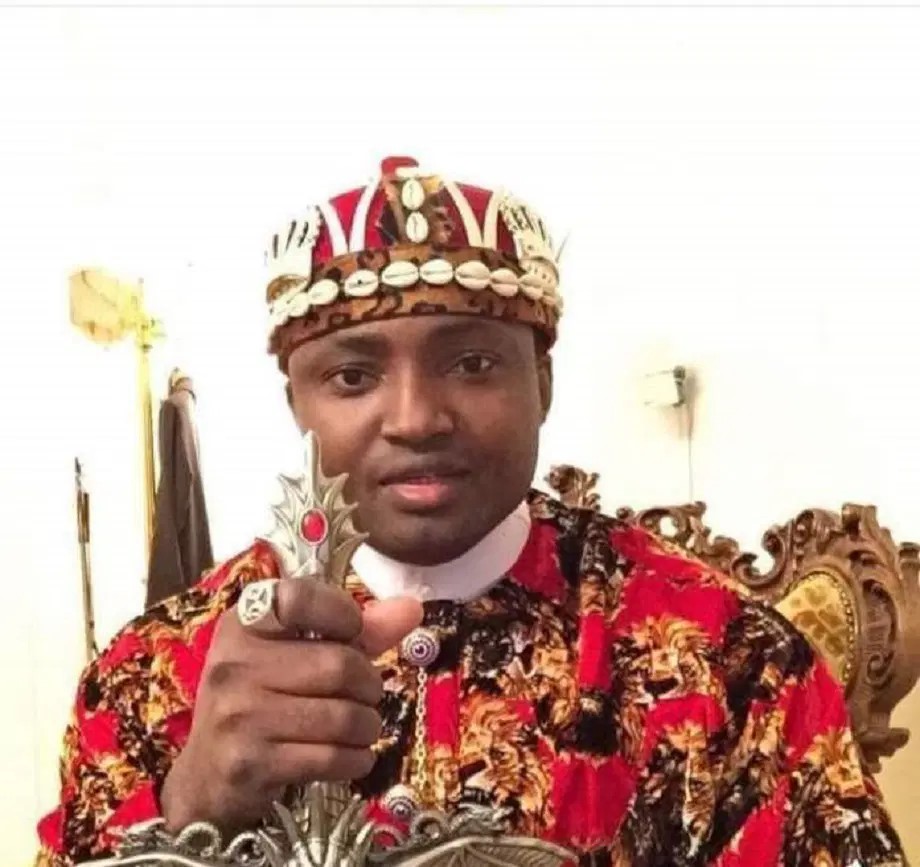In the 1990s and early 2000s, one might wonder why people in Southwest Nigeria gathered every Friday just before 8:00 p.m.
It might also raise questions about why older men and women in their seventies joined these gatherings. However, the reason for these assemblies wasn’t football or any sporting event but the enthralling Nnkan Nbe programme hosted by the late Kolawole Olawuyi.
While the name ‘Kolawole Olawuyi’ might not immediately spark recognition then, the phrase ‘Ha, Nnkan Nbe’ (which means strange things are happening) likely does, evoking memories of the must-watch weekly programme Nnkan Nbe, which he masterfully anchored.
For many fans of Nigerian television, the phrase ‘Ha, Nnkan Nbe’ meaning ‘Strange things are happening’ serves as a nostalgic reminder of the captivating programme that delved into eerie, mysterious events unfolding in society at the time.
Late Olawuyi’s opening phrase and compelling storytelling made the show a phenomenon, etched into the memories of nationwide viewers.
Nnkan Nbe
The programme delved into various eerie and captivating topics, from witches, wizards, and destiny snatchers to mysterious objects in strange locations.
Nigerians need credible journalism. Help us report it.
Support journalism driven by facts, created by Nigerians for Nigerians. Our thorough, researched reporting relies on the support of readers like you.
Help us maintain free and accessible news for all with a small donation.
Every contribution guarantees that we can keep delivering important stories —no paywalls, just quality journalism.
It also uncovered the dark underworld of kidnappers, ritualists, robbers, and notorious landlords known to harm their tenants.
Launched during rapid industry (media outlets) growth, the programme stood out for its originality and quickly became a major topic of public interest.
Each episode was a vibrant tapestry of everyday Nigerian life, addressing pressing societal issues while celebrating the country’s rich cultural diversity.
 Late Kolawale Olawuyi’s ‘Nnkan Nbe’ TV show
Late Kolawale Olawuyi’s ‘Nnkan Nbe’ TV showThe late Olawuyi’s charisma and innovative storytelling enchanted audiences, transforming ‘Nnkan Nbe’ into a beloved cornerstone of Nigerian television.
Viewers were drawn not only to its gripping storylines but also to the relatable characters, who reflected their own lives and experiences.
The birth
Late Olawuyi’s career reached a high point with ‘Nnkan Nbe’, but his groundbreaking radio programmes, such as ‘Ìrírí Ayé’ and ‘Irinkerindo Akolawole’ in the 1990s, were also must-listens. These programmes offered fresh perspectives on human challenges, unravelling “strange but true” mysteries that captivated audiences.
The shows attracted a broad viewership, especially episodes covering Okorocha and Malaika Agba. However, they also faced backlash and eventually became unwelcome at the Federal Radio Corporation of Nigeria (FRCN).
This setback led Olawuyi to establish Kolbim Communications, his independent company, where he produced an audio-visual version of ‘Nnkan Nbe’ for Ogun State Broadcasting Corporation (OGBC) in Abeokuta and later Galaxy Television in Lagos. He remained dedicated to the programme until his death.
 Late Kolawale Olawuyi’s ‘Nnkan Nbe’ TV show
Late Kolawale Olawuyi’s ‘Nnkan Nbe’ TV showWhile Olawuyi might not have been seen as a conventional broadcaster, ‘Nkan Nbe’ stood out for its unique approach. The show exposed the mysterious and often sinister activities of individuals within society, especially in the South-west, airing on numerous radio and TV stations.
PREMIUM TIMES once reported that the late Olawuyi ran a revealing series on ‘Nkan Nbe’, featuring testimonies from former backroom staff and members of late TB Joshua’s Synagogue Church of All Nations (SCOAN), who alleged occult practices and other shocking activities within the church.
Mystery life
Through the groundbreaking programme, the late Olawuyi emerged as a larger-than-life figure, unearthing and investigating cases on a scale that no journalist has matched since his passing.
His courage and confidence, hallmarks of the Ibadan-born broadcaster, set him apart. Many still say, “No one has possessed that kind of audacity since.”
One of Olawuyi’s most widely-known exposes was the case of Reverend King—real name Chukwuemeka Ezeugo—a preacher from Anambra State in southeastern Nigeria. In 2006, Reverend King gained nationwide infamy after being convicted for the murder of a church member, Ann Uzoh. Nigeria’s Supreme Court upheld his death sentence on 26 February 2016.
Beyond the Reverend King case, the late Olawuyi brought countless harrowing stories to the public eye. These included cases of abused children, individuals claiming supernatural powers to harm others, and the chilling tales of “Aja ile”, or underground killing houses, where kidnappers’ hideouts were exposed.
He also covered ritual killings and occult practices in southwestern Nigeria. Notably, he uncovered the story of a woman named Malaika, who declared herself a god with the power to control people’s lives—until Olawuyi’s investigation forced her into the public eye.
Late Olawuyi’s fearless approach and relentless pursuit of the truth made him both admired and feared. Listening to him was an experience that was as thrilling as it was unsettling.
ALSO READ: Ten years after, broadcasters eulogise late Kola Olawuyi
Admirers were captivated by his bravery, while others feared for his life. When he died, many couldn’t shake the feeling that his enemies had finally “gotten him.”
At the end of every broadcast, he would sign off with his signature phrase: “Aa ma be obe nii besu, atelese a bena wo. Eni ba ni a ma bo nikan lawa o ni de ba nle,” which translates loosely to, “We will always set out to work, and it’s those who wish us harm who will fail in their schemes.”
Career
Olawuyi, raised in Ibadan, Oyo State, was born to Williams Inaolaji Olawuyi and Alhaja Olawuyi. He graduated from the Department of Mass Communication at the Polytechnic of Ibadan, marking the beginning of a distinguished career in media.
Olawuyi made his mark at the Federal Radio Corporation of Nigeria (FRCN), where he launched the groundbreaking radio program ‘Ìrírí Ayé’ in 1992. This programme carved a unique niche in Nigerian broadcasting and quickly gained a massive following.
Serving as the Managing Director of Kolbims Communications, Olawuyi died on 4 March 2007, in a Lagos hospital.
At the time of his death, he was close to completing a Master’s program in Communication Arts at the University of Ibadan.
 Late Kolawale Olawuyi’s ‘Nnkan Nbe’ TV show
Late Kolawale Olawuyi’s ‘Nnkan Nbe’ TV showHe was survived by his elderly parents, his wife, Abimbola Olawuyi, and his children.
Beyond his family, Olawuyi left an enduring legacy, having mentored a new generation of radio and television personalities, among them the renowned Gospel Juju artiste and broadcaster, Yinka Ayefele.
In 1999, while employed at Kolbims Communications, Ayefele was en route to the Ogun State Broadcasting Corporation (OGBC) in Abeokuta to assist Olawuyi with the ‘Irinkerindo’ programme when he suffered the accident that left him paralyzed.
In 2015, Ayefele paid homage to his former mentor by reviving Olawuyi’s classic radio show, ‘Irinkerindo Akolawole’, on his radio station, Fresh FM, in Ibadan.
This revival served as a testament to Olawuyi’s enduring influence in Nigerian media.
Support PREMIUM TIMES' journalism of integrity and credibility
At Premium Times, we firmly believe in the importance of high-quality journalism. Recognizing that not everyone can afford costly news subscriptions, we are dedicated to delivering meticulously researched, fact-checked news that remains freely accessible to all.
Whether you turn to Premium Times for daily updates, in-depth investigations into pressing national issues, or entertaining trending stories, we value your readership.
It’s essential to acknowledge that news production incurs expenses, and we take pride in never placing our stories behind a prohibitive paywall.
Would you consider supporting us with a modest contribution on a monthly basis to help maintain our commitment to free, accessible news?
TEXT AD: Call Willie - +2348098788999

















 English (US) ·
English (US) ·